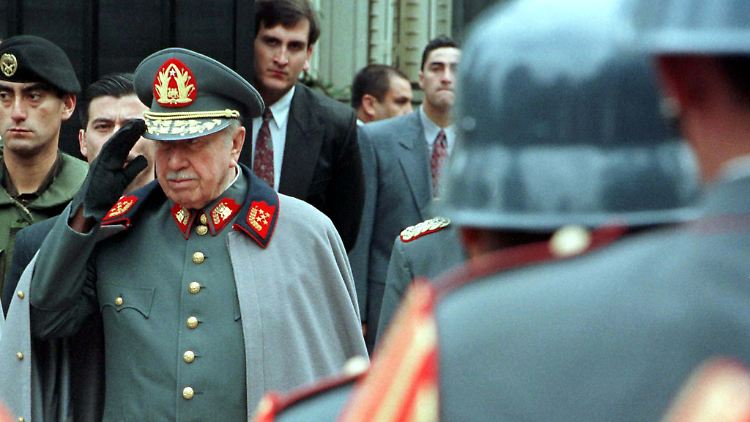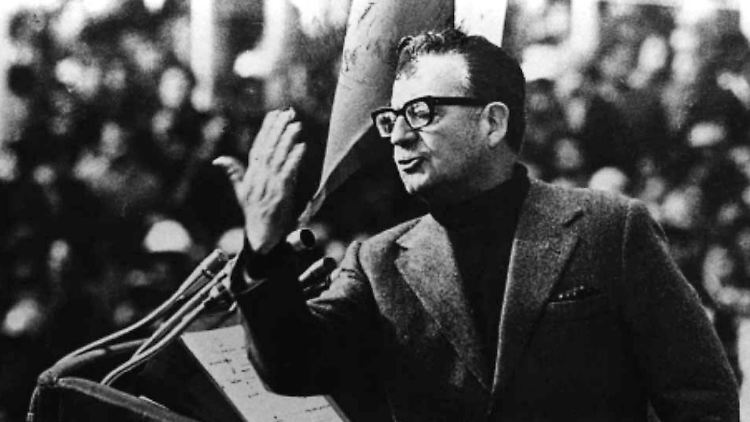It has been half a century since General Pinochet launched a coup against the socialist government in Chile. Political refugees also find refuge in the GDR and the Federal Republic. The coup and its aftermath have shaped the country to this day.
It is September 11, 1973. General Augusto Pinochet and the Chilean military are violently seizing power. Bombs fall on the presidential palace in the heart of Chile’s capital Santiago. The soldiers storm the building. President Salvador Allende is holed up in a room. The socialist had previously refused to surrender. He knows: There is no way out for him. Allende says goodbye to the Chileans in a radio speech. Then he puts a Kalashnikov in his mouth and pulls the trigger.
Within days, the military took control of the institutions. The coup against the first elected left-wing government in the history of the Global South has succeeded. In many parts of the world, especially in Europe, left-wing movements are showing solidarity with the overthrown government. As a result, around 2,000 Chileans received political asylum in the GDR and 4,000 in the Federal Republic.
The private sector is not dissatisfied with the violent change of government. On September 17th, the branch of the German chemical company Hoechst in Santiago informed the headquarters in Frankfurt am Main. “The long-awaited military intervention has finally taken place,” the letter begins. “A campaign (..) prepared down to the last detail and executed brilliantly. (..) Chile will be an increasingly interesting market for Hoechster products in the future.” The country is now “vaccinated against the Marxist virus.”
Pinochet establishes a military dictatorship. The regime closes parliament, censors the press, and dismantles the unions. The repression will last until 1990. The regime murdered at least 3,200 people during these years, and a further 1,162 are still missing, including children. It imprisons and tortures critics of the military in hidden centers across the country. A total of 40,000 people are officially recognized as victims. One of the torture centers is located in the German sect Colonia Dignidad, which also imports and produces weapons for the regime.
In all neoliberal harshness
After coming to power, the general and his comrades-in-arms harshly trimmed the country to be socially conservative and transformed it into an authoritarian-run economic laboratory with the help of neoliberal economists, the “Chicago Boys”, who had studied with Milton Friedman in the USA. The state acts purely as a regulator. The pension system, health care, education, roads, water, almost everything is being privatized. The social consequences are omnipresent and still determine large parts of national politics today.
Allende wanted to achieve the opposite. After his election, he achieved wage increases of an average of 50 percent, implemented land reform and – with the unanimous support of the opposition in parliament – nationalized the economically important copper mines in the country. Until then they had belonged to US corporations. In addition to its own mines, the copper for the US economy came particularly from Chile.
The US secret service’s efforts to influence the election to Allende’s disadvantage had failed. After Allende’s election victory, there was initially an “end of an era” – a “tomorrow we die” – mood in Santiago, as an advisor to Allende’s predecessor described it in the “New York Times” in 1974. The middle class and wealthy people just threw the money around.
Allende’s supporters, on the other hand, were euphoric about the election victory. There was almost full employment and a boom temporarily replaced the recession. But the unleashed demand drives up the import rate and, from 1972, inflation, because the country’s own production cannot keep up. The result is also a food supply crisis that is making life difficult for the population. The Cuban revolutionary leader Fidel Castro, who traveled through Chile for four weeks in 1971, would later say: “Marxism is a revolution of production. Allende was one of consumption.”
From autumn 1972 there were strikes across the country. Allende integrates the military into the government, which temporarily calms the situation. But the peace does not last, and even a successful congressional election for the left cannot save it in the end. In August 1973, the Chilean parliament withdrew its confidence in Allende. This is how Chile’s military later justifies its coup. This is more than convenient for the USA, which supports the opposition financially and is determined to prevent a successful socialist government.
In the midst of the Cold War, Washington does not want another Cuban ally in the region. US President Richard Nixon and his national security advisor Henry Kissinger fear that Chile could become a shining example for other countries. As president, Allende had not only Cuba but also the GDR diplomatically recognized – before the Federal Republic. The socialist government and population there show solidarity with Chile. Some DEFA films are being made – for example about the singer Victor Jara, a member of the Communist Party who was murdered in the first days of the coup.
Fear of a Marxist Italy
A large number of documents on the Chilean case are now publicly available; how it came about and what happened afterward, minutes of conversations, intelligence information, instructions from Nixon and Kissinger. He was sworn in as foreign minister shortly after the coup in Chile. In any case, Nixon had previously listened to Kissinger rather than the head of the State Department. In November 1970, two months after Allende’s election victory, the two spoke on the telephone. “I truly believe this line is important in terms of its impact on the people of the world,” Nixon said [Allende] can show that he can establish anti-American Marxist policies, others will do the same,” said the US president. Kissinger agreed: “It will also have an effect in Europe. Not just in Latin America.” Kissinger particularly mentioned the importance of a possible Marxist model for a socialist Italy.
After a National Security Council meeting on the subject, Nixon’s stand new line: maximum pressure to ensure that Allende’s socialist government fails. U.S. officials are expected to work with other governments in the region – particularly Brazil and Argentina – to coordinate efforts against Allende; Multilateral bank loans to Chile are to be quietly blocked and export credits to the United States are to be canceled. US companies should be encouraged to leave Chile. The international market value of Chile’s most important export – copper – is to be manipulated in order to harm the Chilean economy. The CIA is authorized to develop action plans for the future implementation of the strategy. The head of the secret service at the time would later say that he had never been given so much power and at the same time experienced such secrecy.
From 1972 onwards, production in Chile decreased, inflation ate up real wages, and the state lacked foreign currency for imports; a food supply crisis is the result and the beginning of the end of the socialist government. After Allende’s death in the presidential palace, Kissinger and Nixon congratulated each other in a conversation for having created the conditions for a military coup. The CIA knew about it in advance and BND employees were informed. A warning from the GDR government to Allende came too late.
The violent upheaval in Chile was mingled with a sense of powerlessness on the left across the continent in the face of Northern economic interests. In Bolivia, the military staged a coup against a socialist president in 1971. In 1973, Uruguay’s military established its regime. Peru followed in 1975, Argentina in 1976. Paraguay and Brazil were already under the thumb of the generals. The United States has been involved in several coups in different ways. Thereafter they covertly helped the dictatorships with training in torture methods, planning and international coordination under the name of Operation Condor.
Spirits of the present
Pinochet put Chile into a historical spiral from which the South American country has not found a real way out even 50 years later. The processing was delayed for a long time. In October 2019, decades of dissatisfaction with the consequences of neoliberal politics, social imbalances and a political-economic elite erupted. For months, the militarized police have been engaged in brutal clashes with angry demonstrators. The country is in a state of emergency. The demand of the unrest, the “estallido social”, is a new constitution, a more social market economy and more participation. The old Carta Magna was created under Pinochet’s regime, in which private property is sometimes guaranteed more protection than human rights. “Until life is dignified,” people spray paint on house walls in Santiago. The future of Chile is being discussed in spontaneous meetings on the streets and across the country.
Former student leader Gabriel Boric will be elected president in 2021. He governs with a left-wing coalition, the first since the coup. Borci paraphrases Allende in his victory speech. People cry with happiness on Santiago’s streets. A constitutional process that has been initiated fails at the first attempt. The progressive forces dominate in the drafting of the text, which the majority of Chileans rejected in a referendum. The accusation: The left had incorporated maximum positions into the Carta Magna in order to take revenge for the years of dictatorship. The right has now drawn up a counter-proposal. The plebiscite is still pending, but according to surveys, this draft is also on the verge of failure. The majority still wants a new constitution. Only the path there and the content are highly controversial.
The ghosts of Allende and Pinochet haunt the country to this day. When Guillermo Treillier, a former underground resistance fighter, head of the Communist Party and currently part of the governing coalition, dies at the end of August, Boric says on the sidelines of the funeral: “It was a life dedicated to creating a more just Chile.” Teillier said he “died with dignity, proud of the life he lived. (…) There are others who die like cowards in order not to face justice.”
The statement sparked an outcry from the conservative press and politicians. Boric was referring to another death – that of ex-military man Hernán Chacón Soto, who committed suicide in his home a day earlier. A court sentenced him to 25 years in prison on the same day. He and other military officers were responsible for the murder of singer Victor Jara. The police never got around to arresting the 86-year-old Soto.

